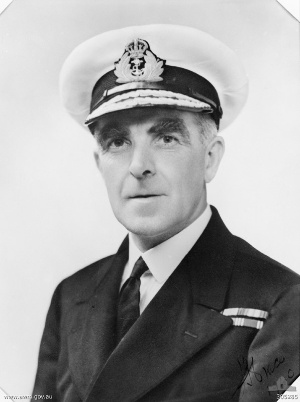John Gregory Crace facts for kids
Quick facts for kids
Sir John Gregory Crace
|
|
|---|---|

Rear Admiral John Crace c.1940
|
|
| Born | 6 February 1887 Gungahlin, NSW, Australia |
| Died | 11 May 1968 (aged 81) Hampshire, England |
| Allegiance | United Kingdom |
| Service/ |
Royal Navy |
| Years of service | 1902–1946 |
| Rank | Vice Admiral |
| Commands held | Chatham Dockyard (1942–46) Task Force 44 (1942) HM Australian Fleet (1939–42) HMS Emerald (1934–37) HMS Osprey (1924–25, 1930–32) HMS Valhalla (1929–30) |
| Battles/wars | First World War Second World War |
| Awards | Knight Commander of the Order of the British Empire Companion of the Order of the Bath |
Sir John Gregory Crace (born February 6, 1887 – died May 11, 1968) was an important Australian officer in the Royal Navy. He became famous for leading a special naval group called Task Force 44 during the Battle of the Coral Sea in 1942. This battle was a major event in World War II.
Contents
Sir John Crace's Early Life
John Crace was born in Gungahlin, which is now part of the Australian Capital Territory. His parents were Kate Marion Crace and Edward Kendall Crace. He went to school in Australia at The King's School in Parramatta. Later, he finished his schooling in the United Kingdom in October 1899.
In May 1902, John Crace joined the Royal Navy as a cadet. This meant he was training to become a naval officer. He trained on a ship called HMS Britannia.
Serving in World War I
After his training, Crace became an expert in torpedoes. Torpedoes are underwater weapons used by ships. During much of the First World War, he served on a large warship called HMAS Australia. This ship was a type of battlecruiser.
Leading the Australian Fleet
Between the two World Wars, Crace traveled back and forth to Australia. He held many different jobs on ships and on land. In September 1939, he was given command of the Australian Squadron. When he arrived in Sydney, he was worried about the condition of the Australian fleet. He even tried to resign from his position.
However, when war with Japan began, Crace was given a new and very important role. He was made the commander of the Allied Naval Squadron, known as the ANZAC Force. This force included ships from different countries working together.
The Battle of the Coral Sea
During the Battle of the Coral Sea in 1942, Crace's ships were patrolling south of New Guinea. They were attacked by Japanese aircraft. Crace and his crew bravely escaped the air raid. This battle was very important because it helped stop Japan from invading Port Moresby.
Later Life and Achievements
In June 1942, Crace returned to Britain. He was promoted to Vice Admiral. He then took command of the Chatham Dockyard, which was a major naval base. He officially retired in 1945 but continued to command at Chatham until July 1946.
For his great service, Sir John Crace received two important awards:
- He was made a Companion of the Order of the Bath in 1941.
- He was appointed a Knight Commander of the Order of the British Empire in 1947. This meant he could use the title "Sir."
Sir John Crace passed away in Hampshire, England, in 1968. A suburb in the Australian Capital Territory is named Crace after his father, Edward Kendall Crace.
 | Selma Burke |
 | Pauline Powell Burns |
 | Frederick J. Brown |
 | Robert Blackburn |

